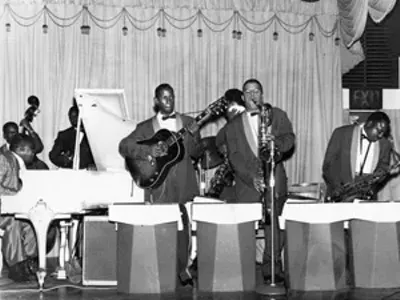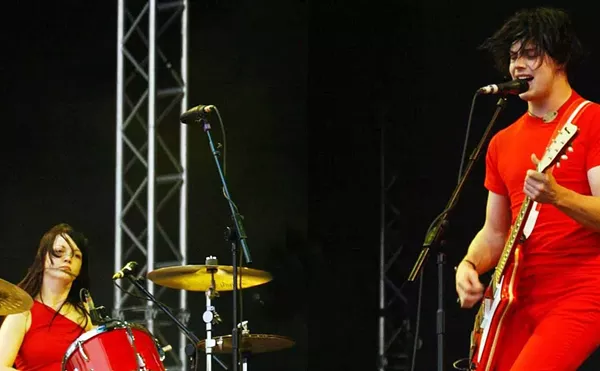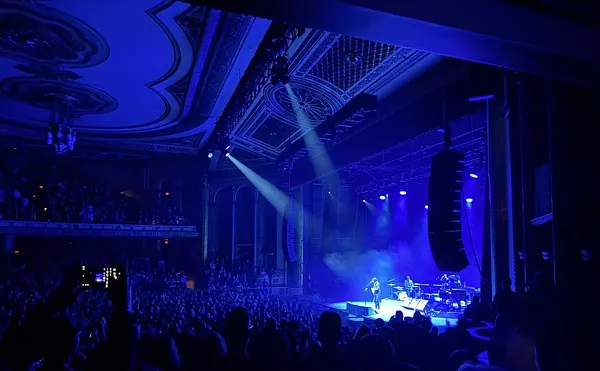
Audio By Carbonatix
[
{
"name": "GPT - Leaderboard - Inline - Content",
"component": "35519556",
"insertPoint": "5th",
"startingPoint": "3",
"requiredCountToDisplay": "3",
"maxInsertions": 100,
"adList": [
{
"adPreset": "LeaderboardInline"
}
]
}
]
We caught up with the hyper-busy Benny Golson as he was in the midst of rehearsing a new band for a club debut and recording session. Benny Golson's New Jazztet recalls the group he co-led in the early '60s and in subsequent revivals with his frequent musical partner, the late Art Farmer. But rather than dwell on the tunes associated with the old group — including Golson's many jazz standards — this band is about new material, from interpretations of Verdi to Sonny Rollins and Motown's "Ain't No Mountain High Enough." The Benny Golson Quartet, on the other hand, the group he's bringing to Detroit, will revisit some of Golson's best-known pieces, including "Whisper Not," "Stablemates" and "I Remember Clifford," although he emphasizes that "music is too broad for me just to play my music; that would be foolish."
Golson's 80th birthday, in 2009, is to be celebrated with both retrospectives (in New York and Chicago) and commissions (including ones from Harvard and Juilliard). He's also watching over as an editor works on his memoirs, the first draft of which totaled about 1,000 pages. "Who wants to read two volumes about Benny Golson?" he asks rhetorically, as he explains the manuscript has been cut by two-thirds. Still, there's a lot to cover in a career that ranges from the Philly jazz scene of the '50s (where he practiced alongside the likes of a young John Coltrane) to being part of the '60s New York scene to becoming one of the most noted composers in jazz. Then came a stint in Hollywood (supplying music for shows like M*A*S*H and Ironside) to re-entering the jazz world after a long hiatus and playing a pivotal cameo in Tom Hanks' and Steven Spielberg's film, The Terminal.
We picked Golson's mind on a number of topics.
"Killer Joe"
"Killer Joe" — thanks to Quincy Jones' 1969 hit version — may be Golson's most widely recognized melody. But Golson's heartfelt tribute to trumpeter Clifford Brown is on another plane among jazz fans.
I was in Japan about two or three years ago with Ron Carter, and you know the Japanese are very punctilious people. You can ask any one of them who played third alto with Benny Goodman in 1937, and — wham! — they'll tell you just like that. And one of them approached me and asked me if I knew how many recordings there are of "I Remember Clifford." And, of course, I didn't know. And he told me 334 at that time.
On the creative process:
It always has its beginning in the same way. Creativity comes in many different forms, but creativity always begins with the element of curiosity. Next comes imagination. And after imagination comes creativity. Creativity is when you bring into life something that doesn't have prior life — some are successful and some are not so successful. Some are memorable; some are forgettable. It's like the Frankenstein monster. If you saw that 1937 film, where the gurney was raised and the monster's hand moved and the creator screamed out "He's alive! He's alive!" And that's very much like what creating music is. It's like giving birth.
On what lies ahead:
Music is like an adventure. Every day you wake up and say, "What can I do today that I didn't do yesterday." Or "What can I learn today that I didn't know yesterday." It's a perpetual thing. It's an unending thing; there is no end to it. It's like walking with one foot into the darkness of the unknown. Sometimes things are waiting for your discovery, saying, "Here I am, over here, over here." So there are many things that I haven't done. Maybe time is my enemy. I hope not, not too much.
On the Jazztet's 1959 debut:
The band was booked on the same bill at the Five Spot with Ornette Coleman's New York debut, one of the most controversial and written-about events in jazz history. Golson insists that attention to Coleman's radical musical ideas did not particularly detract from the impact the Jazztet would have made opening any other time. But he shares this anecdote about the hubbub around Coleman's big moment:
Thelonious Monk came in one night. He came in with a lot of bravado. There were two doors to the entrance of that club. And while Ornette was on, we heard the first door bang: blam! And everybody turned and looked. And then the second door opened — they were swinging doors — blam! And he went and stood directly in front of the bandstand with his hand on his hips while Ornette was playing. And he stood there for about 30 seconds to check this guy out. And he stormed out: blam! The inner doors banged, and the outer doors banged: blam! And he was gone. During that 30 seconds, he had some inkling of what Ornette Coleman was all about. And maybe he was thinking, "Who is this other guy who's come to take my place as the weird composer or performer? Who is this guy who's going to supplant me?" Who knows? But, anyway, he was gone.
W. Kim Heron is editor of Metro Times. Send comments to wkheron@metrotimes.com




